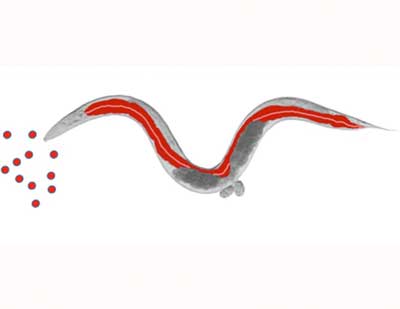| Oct 25, 2019 | |
Nano-size food additives affect nutrient uptake in worms(Nanowerk News) Nanoparticles from silicon dioxide (silica; SiO2) are added to food products for example as anticaking agent. |
|
| Recent research results from the model organism Caenorhabditis elegans show that within the intestinal cells of the roundworm nano silica disturb the uptake and use of digested proteins. | |
 |
|
| Microscopic picture of C. elegans with schematic nanoparticles (round, red) and the distribution of the nanoparticles after ingestion within the intestine (also red). (Image: A. von Mikecz / IUF) | |
| The building blocks of proteins are deposited in storage vesicles within the intestinal cells and are not available for subsequent metabolism. Thereby the worms remain small, have less offsprings and show premature aging. | |
| This is a disadvantage for wild roundworms which are exposed to nanoparticles in the environment. If those nano scaled food additives also have a negative impact on human nutrition needs to be investigated. | |
| The corresponding study was conducted by Professor Anna von Mikecz, group leader at IUF – Leibniz Research Institute for Environmental Medicine in Düsseldorf, and her coworkers and published in Nanotoxicology ("Silica nanoparticles disrupt OPT-2/PEP-2-dependent trafficking of nutrient peptides in the intestinal epithelium"). | |
| “Silica nanoparticles act as nutrition trap in the intestine of the roundworm and thereby lead to malnutrition, reduced fitness and premature aging”, explains Prof. Anna von Mikecz. “In the next step we will investigate if and how the changes in the intestine also affect the nervous system in our model system.” |
| Source: Leibniz Research Institute for Environmental Medicine | |
|
Subscribe to a free copy of one of our daily Nanowerk Newsletter Email Digests with a compilation of all of the day's news. |
